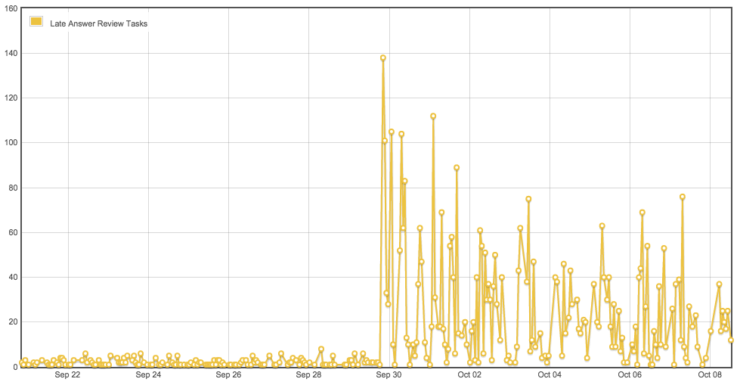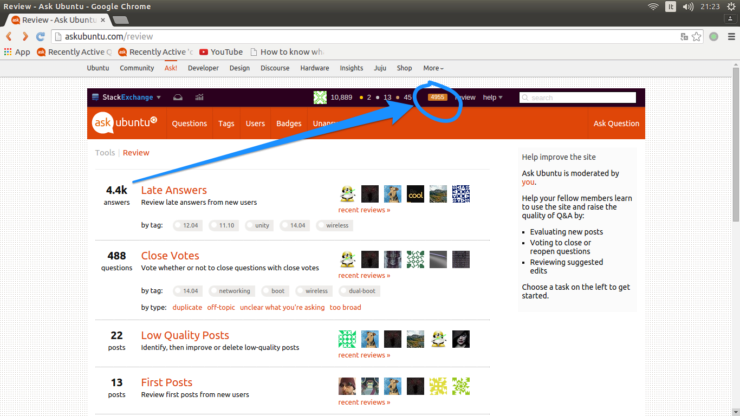My Adventure with Late Answers

Last week, I finally got around to analyzing a change to the Late Answers review queue. For those who aren’t familiar with Stack Exchange, review queues give experienced users a chance to look over posts from new users for problems that can be corrected or hidden gems. The later is particularly important for answers that come over a month after a question was asked, since those answers often get ignored. Increasing the pool of new users eligible for consideration seemed like a good way to combat the commonly-held perception that Stack Overflow is rude.
My main concern was that by adding more reviews, we might get into a situation where more answers were being added to the queue than the reviewers could handle. That can be a problem since ever-growing queues demoralize reviewers. So most of my analysis was geared toward predicting how many extra tasks my change would create. By my estimate, it would add roughly 300 tasks a day on Stack Overflow and maybe a dozen on other large sites. Given Stack Overflow users review tens of thousands of posts a day, these numbers seemed manageable.
| Site Name | New Tasks |
|---|---|
| Stack Overflow | 314 |
| Super User | 13 |
| Server Fault | 9 |
| Apple | 7 |
| Gaming | 5 |
| Ubuntu | 4 |
| All others | 3 or fewer |
After this analysis, I consulted a colleague and decided to just change the site setting and see what happens:
So my estimate was about 4 orders of magnitude wrong. With a single change of a variable, I’d increased this site’s outstanding reviews 10 fold. And I’d made the change on every site on the network. Not only that, but there is no easy way to remove review tasks except by, well, reviewing them. I’d managed to inadvertently create a bunch of work for thousands of people. My immediate reaction was panic.
Then I got down to business figuring out what had happened. It quickly was clear that the change picked up late answers that were older than a day. Initially, I thought the code was only picking up a month’s worth of posts (more on this later), but comments on my answer fixed my misunderstanding. In fact, the change put all answers ever that fit the new criteria up for review.
Meanwhile, I’d notified the network’s moderators of the change and, thanks to their encouragement, featured the meta post describing the change on the sidebar across the network. Many sites had already started noticing the change and answering the meta questions became an addition task for moderators and involved users. I couldn’t keep up with those posts, but looking back a week later it’s gratifying to see so many informed (and considered) answers from other users.
Also meanwhile, people were working hard to remove tasks from the queue:

This activity is on Ask Ubuntu, but I could show similar charts from all sorts of sites. Traditionally, Late Answers tend to be a backwater of the review queues, so the sudden spike was a rare opportunity to earn badges for that queue. The week before my change, there were 5 Custodian badges—the bronze level for doing just one review. In the following week:
| Badge | Queue | Awarded |
|---|---|---|
| Custodian | Late Answer | 6 |
| Reviewer | Late Answer | 7 |
| Steward | Late Answer | 1 |
The Steward badge requires 1,000 Reviews, which is pretty hard to accomplish when there are only 300 or so a week divided among hundreds of interested users.
As the initial crisis began to die down, I started to wonder why Stack Overflow hadn’t exploded. The answer, which I’d noticed in the code before starting research:
(Current.Site.IsStackOverflow ? "and p.CreationDate > GETUTCDATE() - 7" : "")So I was saved by a special case that was, no doubt, built in for just this purpose. On Stack Overflow, the code does not consider answers older than a week, so it only spiked to 1500 or so. Why did I think the code looked back 30 days? I don’t really know, but I think I got that from the definition of a “late answer”: 30 days after the question was asked.
Lessons learned
Reading the code is no substitute for testing. Well, I’ve known this for at least 20 years. But thanks to my high self-esteem, I need to relearn this yearly, it seems. We have a development environment which would have been a perfect place to discover that the queue was going to spike, if only I’d thought to try there first. Alas, I did not so think.
If you are about to make a change that might effect thousands of other people, you might want to test it first. The bit I didn’t consider was that people don’t just see the number of outstanding reviews when they go to the review page. The number also gets displayed for people with 500+ reputation on the top bar visible on every page on the site. So plenty of people noticed even if they don’t make a habit of reviewing.
Don’t make a dramatic change if you can make several small changes instead. Many of the comments/forceful suggestions I received in the aftermath of my fateful change hinted that a more controlled increases in reviews would have eased the concern people had. There were any number of ways I could have boiled the frog, but the easiest would have been to increase the reputation limit in increments of 5 or 10 followed by quiescence until we reach the desired limit. The thought never crossed my mind.
Even if you plan to make a change no matter what, it helps to notify people in advance. Obviously, knowing the actual impact of the change is a prerequisite to announcing a coming change. But if I’d known, I still would have wanted to increase the Late Answer pool. Obviously, I couldn’t ask everyone who has a stake. However, it would be good to let the moderators know what to expect at least a few hours in advance.
Future work
I’d really like to see about increasing the reputation level to 100. But before I do that, I really should take advantage of the natural experiment created by the change to 50. How did people handle the flood of late answers? Overall, did we find hidden gems or just superfluous answers? In the weeks to come, will people who benefited from upvoted answers in this queue tend to contribute more and better answers? Or has the feedback come too late?

